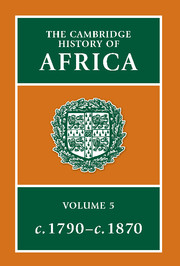Book contents
- Frontmatter
- Introduction
- 1 Egypt and the Nile Valley
- 2 Ethiopia and the Horn
- 3 The Maghrib
- 4 The nineteenth-century jihads in West Africa
- 5 Freed slave colonies in West Africa
- 6 West Africa in the anti-slave trade era
- 7 The forest and the savanna of Central Africa
- 8 East Africa: the expansion of commerce
- 9 The Nguni outburst
- 10 Colonial South Africa and its frontiers
- 11 Tradition and change in Madagascar, 1790–1870
- 12 Africans overseas, 1790–1870
- 13 Changing European attitudes to Africa
- Bibliographical Essays
- Bibliography
- Index
- References
5 - Freed slave colonies in West Africa
Published online by Cambridge University Press: 28 March 2008
- Frontmatter
- Introduction
- 1 Egypt and the Nile Valley
- 2 Ethiopia and the Horn
- 3 The Maghrib
- 4 The nineteenth-century jihads in West Africa
- 5 Freed slave colonies in West Africa
- 6 West Africa in the anti-slave trade era
- 7 The forest and the savanna of Central Africa
- 8 East Africa: the expansion of commerce
- 9 The Nguni outburst
- 10 Colonial South Africa and its frontiers
- 11 Tradition and change in Madagascar, 1790–1870
- 12 Africans overseas, 1790–1870
- 13 Changing European attitudes to Africa
- Bibliographical Essays
- Bibliography
- Index
- References
Summary
Strictly speaking, the only European colony on the Western side of Africa before the end of the eighteenth century was Portuguese Angola. Elsewhere Europeans who settled to trade paid rent for their settlements to African rulers. Sovereignty was not surrendered. African rulers followed the precedent set in 1482, when the Portuguese were grudgingly permitted to build a fort at Elmina in return for a regularly paid rent. There were a few exceptions to this rule, but normally European traders were only allowed to settle in West Africa if they made regular payments in return. There was no transfer of sovereignty in these settlements.
All along the coast African rulers and European traders were united by the reciprocal obligations of ‘landlord’ and ‘stranger’. The land-lords protected their strangers and undertook to provide them with trade. Hence, in the period of the slave trade, Europeans did not appear in West Africa north of the equator as invaders or masters, but as equal trading partners.
Whatever misery they brought to those they purchased and shipped across the Atlantic, European slave traders were welcomed by their African customers. They offered, in return for slaves, a wide range of manufactured goods otherwise unobtainable in West Africa. Both trading partners, African and European, received the commodity they wanted, and made the best bargain they could. Yet, though individual Africans might often outwit their European customers, the overall economic advantage lay with the Europeans. In return for slaves, wealth-creating human machinery, they gave expendable consumer goods, turned out in growing volume by the expanding economy of industrializing Europe.
- Type
- Chapter
- Information
- The Cambridge History of Africa , pp. 170 - 199Publisher: Cambridge University PressPrint publication year: 1977
References
- 4
- Cited by

